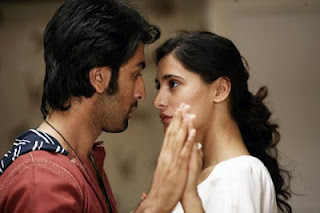Don’t let the title fool you; Rockstar is about neither rock nor stardom. The hero is a musician, and he does become a star, but that is immaterial. Instead, this is a capital-L Love Story. It’s Romeo and Juliet, complete with balcony scene and big finish in Verona. It’s the Punjabi romantic tragedy of Heer and Ranjha (lest you miss that connection, the heroine’s name is Heer). And it’s a fairy tale, one of the darker ones where the fairies are jealous taskmasters, the princess can’t stop dancing, and the happily-ever-after fails to materialize.
And as with any big, sweeping love story, you can jeer or you can let the story wash you away. Maybe it’s just a matter of the mood you’re in when you watch. Plausible? No, not in the slightest. Effective? Well, if you’re up for it, yes.
Love doesn’t sneak up and catch Janardhan (Ranbir Kapoor) unawares. It doesn’t happen gradually, either—instead, he goes looking for it, having heard that its wondrous power will transform him into a better musician. He says that’s what he wants, but he’s young and shallow and doesn’t seem to have strong feelings about much of anything.
Janardhan is like a visitor from another world trying to imitate earthling habits. The other boys at his college call Heer (Nargis Fakhri) a “heartbreaker,” so he watches her intently for a while and then marches off to tell her he’s smitten. Secretly, he hopes she’ll hurt him enough to give him some depth.
She’s beautiful, popular, and engaged to be married. He’s a nobody with a dorky haircut and an awkward posture. He’s persistent, almost stalker-ish, in his pursuit of the broken heart to which the girl is only incidentally attached. And finally she tells him off, so he stops.
And then they rather sweetly become friends. He manages to relax around her and discovers that she’s not the “neat and clean” stereotype he had imagined. Heer awakens, maybe for the first time, some kind of genuine feeling in him—they get to know each other and like what they find. She lists things she wants to do before she gets married, as if marriage is the end of her life. And then she does get married (in what Wikipedia breathlessly tells us is “the first time in Bollywood that a Kashmiri Pandit wedding was shown”), and from there the movie is all about Janardhan—now Jordan—doing his utmost to rescue Heer from that fate.
He becomes a successful musician, travels to Prague (Heer is living there, because Movie Logic)—and then one day he happens on a band of Czech-gypsies-as-imagined-by-Bollywood-filmmakers and finally discovers what kind of a story he’s in:
The lyrics tell of a princess who wears out twelve pairs of shoes in her sleep each night; the young man who seeks to solve the mystery discovers that the wind whirls her off to go dancing. And when I had seen this song, everything suddenly fell into place for me: I now expected not The Doors, but a big, impossible fairy story.
Jordan gets acclaim and vast wealth; Ranbir, descended from Bollywood royalty, looks utterly believable as a rock star*. (The music, from the man known in India as “Oscar winner A.R. Rahman,” works with the swelling emotional peaks of the story, but never remotely resembles rock. Tellingly, at one point Jordan performs before a wowed Euro-crowd so aged and prosperous that it looks like a Kennedy Center command performance.) And Jordan gets the girl. Although Heer’s husband can safely be ignored, apparently being made of the kind of plastic that comes with an unlimited credit line, the lovers find their infidelity searing—she because she's a nice Indian girl, and he because he realizes that he’s the one who whirls Heer off to go dancing night after night.
 |
| Lymphosarcoma of the intestines? |
And yes, snark-worthy as the plot is, I was totally buying it at this point. Ranbir is a very fine actor, Nargis Fakhri is lovely, and together they make sparks fly. Maybe it's soapy, but it's also operatic--and I know that if the dancing lady spends too much time in Fairyland, of course she must die. [Spoiler alert: Juliet and Heer don’t fare so well themselves.]
 |
| Heer and Jordan, an artist's interpretation |
But I guess the Gentleman with Thistledown Hair, soulless though he may be, has the consolation of knowing that the lady will twirl with him in the fairy ballroom through all eternity.
*Nobody asked me, but rock star is two words. Just sayin'.


No comments:
Post a Comment